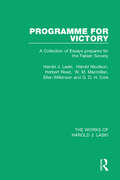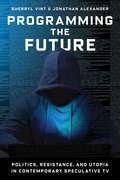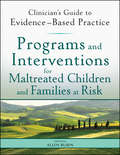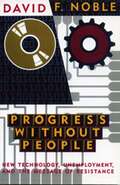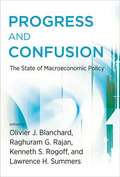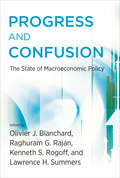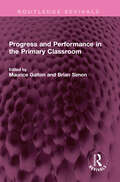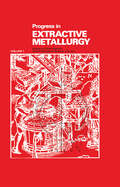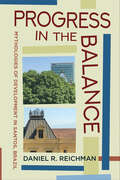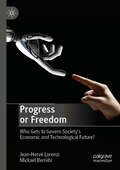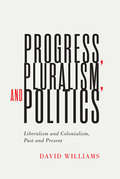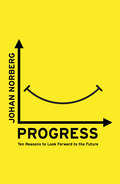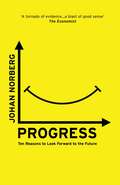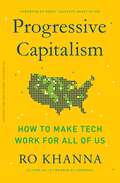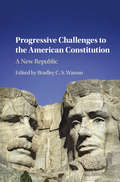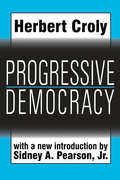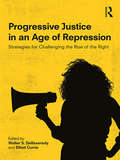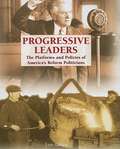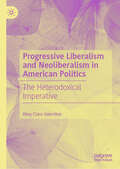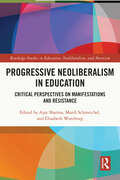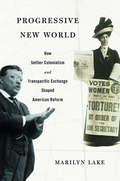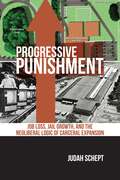- Table View
- List View
Programme for Victory (The Works of Harold J. Laski)
by Herbert Read Harold Nicolson Ellen Wilkinson Harold J. Laski W. M. Macmillan G. D. ColeWritten two years after the commencement of the Second World War, the chapters in this book succinctly put forward the case for reorganizing the foundations of the social order, by rejecting capitalism and historical equilibrium, both in Europe and further afield in the British Empire, in favour of building a Socialist civilization.
Programming the Future: Politics, Resistance, and Utopia in Contemporary Speculative TV
by Professor Sherryl Vint Professor Jonathan AlexanderFrom 9/11 to COVID-19, the twenty-first century looks increasingly dystopian—and so do its television shows. Long-form science fiction narratives take one step further the fears of today: liberal democracy in crisis, growing economic precarity, the threat of terrorism, and omnipresent corporate control. At the same time, many of these shows attempt to visualize alternatives, using dystopian extrapolations to spotlight the possibility of building a better world.Programming the Future examines how recent speculative television takes on the contradictions of the neoliberal order. Sherryl Vint and Jonathan Alexander consider a range of popular SF narratives of the last two decades, including Battlestar Galactica, Watchmen, Colony, The Man in the High Castle, The Expanse, and Mr. Robot. They argue that science fiction television foregrounds governance as part of explaining the novel institutions and norms of its imagined futures. In so doing, SF shows allegorize and critique contemporary social, political, and economic developments, helping audiences resist the naturalization of the status quo. Vint and Alexander also draw on queer theory to explore the representation of family structures and their relationship to larger social structures. Recasting both dystopian and utopian narratives, Programming the Future shows how depictions of alternative-world political struggles speak to urgent real-world issues of identity, belonging, and social and political change.
Programs and Interventions for Maltreated Children and Families at Risk
by Allen RubinEvidence-based interventions are increasingly being required by third-party payers and an evidence-based orientation has come to define ethical practice. This compendium of short, how-to chapters focuses on the programs and interventions to prevent child maltreatment that have the best scientific evidence supporting their effectiveness. Interventions and programs discussed include Cognitive Behavioral Therapy, EMDR, Multisystemic Therapy, Coping Cat, and many more. Busy practitioners will appreciate this book's implementation of evidence-based practices by providing the practical and "what now" rather than using the typical academic approach.
Programs to Reduce Teen Dating Violence and Sexual Assault: Perspectives on What Works
by Arlene Weisz Beverly BlackArlene Weisz and Beverly Black interview practitioners from more than fifty dating violence and sexual assault programs across the United States to provide a unique resource for effective teen dating violence prevention. Enhancing existing research with the shared wisdom of the nation's prevention community, Weisz and Black describe program goals and content, recruitment strategies, membership, structure, and community involvement in practitioners' own words. Their comprehensive approach reveals the core techniques that should be a part of any successful prevention program, including theoretical consistency, which contributes to sound content development, and peer education and youth leadership, which empower participants and keep programs relevant.Weisz and Black show that multisession programs are most useful in preventing violence and assault, because they enable participants to learn new behaviors and change entrenched attitudes. Combining single- and mixed-gender sessions, as well as steering discussions away from the assignment of blame, also yield positive results. The authors demonstrate that productive education remains sensitive to differences in culture and sexual orientation and includes experiential exercises and role-playing. Manuals help in guiding educators and improving evaluation, but they should also allow adolescents to direct the discussion. Good programs regularly address teachers and parents. Ultimately, though, Weisz and Black find that the ideal program retains prevention educators long after the apprentice stage, encouraging self-evaluation and new interventions based on the wisdom that experience brings.
Progress Without People: New Technology, Unemployment, and the Message of Resistance
by David F. NobleA provocative discussion of the role of technology and its accompanying rhetoric of limitless progress in the concomitant rise of joblessness and unemployment.
Progress and Confusion: The State of Macroeconomic Policy
by Raghuram Rajan Kenneth Rogoff Olivier Blanchard Lawrence H. SummersWhat will economic policy look like once the global financial crisis is finally over? Will it resume the pre-crisis consensus, or will it be forced to contend with a post-crisis "new normal"? Have we made progress in addressing these issues, or does confusion remain? In April of 2015, the International Monetary Fund gathered leading economists, both academics and policymakers, to address the shape of future macroeconomic policy. This book is the result, with prominent figures -- including Ben Bernanke, Lawrence Summers, and Paul Volcker -- offering essays that address topics that range from the measurement of systemic risk to foreign exchange intervention. The chapters address whether we have entered a "new normal" of low growth, negative real rates, and deflationary pressures, with contributors taking opposing views; whether new financial regulation has stemmed systemic risk; the effectiveness of macro prudential tools; monetary policy, the choice of inflation targets, and the responsibilities of central banks; fiscal policy, stimulus, and debt stabilization; the volatility of capital flows; and the international monetary and financial system, including the role of international policy coordination. In light of these discussions, is there progress or confusion regarding the future of macroeconomic policy? In the final chapter, volume editor Olivier Blanchard answers: both. Many lessons have been learned; but, as the chapters of the book reveal, there is no clear agreement on several key issues. ContributorsViral V. Acharya, Anat R. Admati, Zeti Akhtar Aziz, Ben Bernanke, Olivier Blanchard, Marco Buti, Ricardo J. Caballero, Agustín Carstens, Jaime Caruana, J. Bradford DeLong, Martin Feldstein, Vitor Gaspar, John Geanakoplos, Philipp Hildebrand, Gill Marcus, Maurice Obstfeld, Luiz Awazu Pereira da Silva, Rafael Portillo, Raghuram Rajan, Kenneth Rogoff, Robert E. Rubin, Lawrence H. Summers, Hyun Song Shin, Lars E. O. Svensson, John B. Taylor, Paul Tucker, José Viñals, Paul A. Volcker
Progress and Confusion: The State of Macroeconomic Policy
by Raghuram Rajan Kenneth Rogoff Olivier Blanchard Lawrence H. SummersLeading economists consider the shape of future economic policy: will it resume the pre-crisis consensus, or contend with the post-crisis “new normal”? What will economic policy look like once the global financial crisis is finally over? Will it resume the pre-crisis consensus, or will it be forced to contend with a post-crisis “new normal”? Have we made progress in addressing these issues, or does confusion remain? In April of 2015, the International Monetary Fund gathered leading economists, both academics and policymakers, to address the shape of future macroeconomic policy. This book is the result, with prominent figures—including Ben Bernanke, John Taylor, and Paul Volcker—offering essays that address topics that range from the measurement of systemic risk to foreign exchange intervention.The chapters address whether we have entered a “new normal” of low growth, negative real rates, and deflationary pressures, with contributors taking opposing views; whether new financial regulation has stemmed systemic risk; the effectiveness of macro prudential tools; monetary policy, the choice of inflation targets, and the responsibilities of central banks; fiscal policy, stimulus, and debt stabilization; the volatility of capital flows; and the international monetary and financial system, including the role of international policy coordination.In light of these discussions, is there progress or confusion regarding the future of macroeconomic policy? In the final chapter, volume editor Olivier Blanchard answers: both. Many lessons have been learned; but, as the chapters of the book reveal, there is no clear agreement on several key issues.ContributorsViral V. Acharya, Anat R. Admati, Zeti Akhtar Aziz, Ben Bernanke, Olivier Blanchard, Marco Buti, Ricardo J. Caballero, Agustín Carstens, Jaime Caruana, J. Bradford DeLong, Martin Feldstein, Vitor Gaspar, John Geanakoplos, Philipp Hildebrand, Gill Marcus, Maurice Obstfeld, Luiz Awazu Pereira da Silva, Rafael Portillo, Raghuram Rajan, Kenneth Rogoff, Robert E. Rubin, Lawrence H. Summers, Hyun Song Shin, Lars E. O. Svensson, John B. Taylor, Paul Tucker, José Viñals, Paul A. Volcker
Progress and Performance in the Primary Classroom (Routledge Revivals)
by Maurice Galton Brian SimonFirst published in 1980, Progress and Performance in the Primary Classroom assesses the performance of primary schoolchildren in a range of study skills as well as on the more conventional tests of mathematics, language use and reading. The findings indicate that the more successful styles are used by the more experienced teachers, who manage to increase the amount of contact with the pupils by a variety of organizational strategies. While pupils who receive the greatest amount of class teaching do best on mathematics, there is no evidence to suggest that the characteristics of teaching valued by critics of modern primary practice exert any significant influence on pupil progress. The relationship between pupil progress and behaviour shows some remarkable patterns. For example, it was found that children who work on average one day per week less than other children still make the same progress in basic skills as the others. Such findings suggest that there is a need to examine how far teaching in the junior school is sufficiently stimulating and challenging, while at the same time acknowledging the difficulties of improving the situation while class sizes remain relatively high. This book will be of interest to students of education and pedagogy as well as to teachers.
Progress in Extractive Metallurgy: v. 1
by Fathi HabashiDerives from an unprecedented seminar held at Columbia University's School of International and Public Affairs in November 1990. At the seminar, leading Western diplomatic and military historians and Vietnam scholars met with prominent Vietnamese Communists to reflect on the Vietnam War.
Progress in French Tourism Geographies: Inhabiting Touristic Worlds (Geographies of Tourism and Global Change)
by Mathis StockThis book provides an overview of the recent progress in Francophone tourism geography. It focuses on the theoretical advances in social and cultural geography, whereby the symbolic dimensions of tourism and the creation of tourism worlds are key. It puts forward the tourist conceived as mobile, situated, skilled, reflexive inhabitant of places, which gives all its meaning to the expression “inhabiting touristic worlds”. More specifically, this book addresses numerous rarely addressed issues such as the geo-history of tourism, the material cultures of tourists, the digitality and disconnection from digital technologies in National Parcs or the use of knowledge of tourists in metropolises. It gives insights in the specific Francophone approaches such as inhabiting, the urbanity of tourist resorts and the notion of territory in tourist studies. Finally, it provides an overview of the urban dimensions of tourism, place-making in the form of heritage, oasis tourism, sports tourism, production of space in Mexican resorts. As such, the book provides a key read for academics, students and professionals in tourism studies and tourism geography in search for alternative approaches.
Progress in Improving Project Management at the Department of Energy: 2001 Assessment
by Committee for Oversight Assessment of U.S. Department of Energy Project ManagementA report on Progress in Improving Project Management at the Department of Energy
Progress in the Balance: Mythologies of Development in Santos, Brazil
by Daniel R. ReichmanThrough a historical ethnography of Santos, Brazil, Progress in the Balance addresses and assesses an anthropological theory of progress. Observing that anthropology is a progressive discipline with a pessimistic attitude towards progress, Daniel Reichman explains the contested meanings of progress in Brazil and explores how anthropologists and others can define this concept more generally. He investigates how any society can separate "progress" from plain old change and, if change is constantly happening all around us, how and why certain events get lifted out of a normal timeframe and into a mythic narrative of progress.Each chapter outlines a particular episode in the history of Santos, a city undergoing an unprecedented period of economic and political turmoil, as it is represented in public culture, mainly through museums, monuments, art, and public events. Drawing on the anthropology of myth, Reichman proposes a model that he refers to as a "clash of timescapes." Progress in the Balance shows how this concept of "progress" requires a different temporal structure that separates sacralized social change from mundane historical events.
Progress or Freedom: Who Gets to Govern Society’s Economic and Technological Future?
by Jean-Hervé Lorenzi Mickaël BerrebiTechnological dominance is shifting the balance of global economic stability. This is the central premise behind the latest book from Lorenzi and Berrebi who view the rise of artificial intelligence, robotics, use of private data, and genetic transformation, among other developments, culminating in new economic conditions that require a fresh sense of governance in order for society to sustain order. Whilst progress in technology provides numerous opportunities and hope, is the desire to pursue these ambitions in innovation putting our society at risk of being undermined and, ultimately, governed by technology firms? How will these changes affect economic outlooks in an age of growing inequality and aging populations? What role do politicians serve in facilitating these changes? The decline of a labour force, the use of Big Data and increased speeds of communication are but three examples that the authors address in their quest to understand where the limits should lie between progress and disruption for the future of society.
Progress, Pluralism, and Politics: Liberalism and Colonialism, Past and Present (McGill-Queen's Studies in the History of Ideas #79)
by David WilliamsLiberal thinkers of the eighteenth and nineteenth centuries were alert to the political costs and human cruelties involved in European colonialism, but they also thought that European expansion held out progressive possibilities. In Progress, Pluralism, and Politics David Williams examines the colonial and anti-colonial arguments of Adam Smith, Immanuel Kant, Jeremy Bentham, and L.T. Hobhouse.Williams locates their ambivalent attitude towards European conquest and colonial rule in a set of tensions between the impact of colonialism on European states, the possibilities of progress in distant and diverse places, and the relationship between universalism and cultural pluralism. In so doing he reveals some of the central ambiguities that characterize the ways that liberal thought has dealt with the reality of an illiberal world. Of particular importance are appeals to various forms of universal history, attempts to mediate between the claims of identity and the reality of difference, and the different ways of thinking about the achievement of liberal goods in other places.Pointing to key elements in still ongoing debates within liberal states about how they should relate to illiberal places, Progress, Pluralism, and Politics enriches the discussion on political thought and the relationship between liberalism and colonialism.
Progress: Ten Reasons to Look Forward to the Future
by Johan NorbergIt's on the televisions, in the papers and in our minds. Every day we're bludgeoned by news of how bad everything is - financial collapse, unemployment, growing poverty, environmental disasters, disease, hunger, war. But the rarely acknowledged reality is that the economic and social progress of the past few decades has been unprecedented and that by almost any index you care to identify, things are markedly better now than they have ever been for almost everyone alive.Examining official data from the world's most trusted institutions like the United Nations, the World Bank and the World Health Organization, political commentator Johan Norberg traces just how far we have come in tackling the greatest global problems. None of them have been eradicated, but as Norberg shows we now have a good idea of the solutions and have started to implement them in most areas. We know what it will take to see this progress continue. Dramatic, uplifting and sure to be divisive, Progress is a call for optimism in our pessimistic, doom-laden world.
Progress: Ten Reasons to Look Forward to the Future
by Johan NorbergA Book of the Year for The Economist and the Observer Our world seems to be collapsing. The daily news cycle reports the deterioration: divisive politics across the Western world, racism, poverty, war, inequality, hunger. While politicians, journalists and activists from all sides talk about the damage done, Johan Norberg offers an illuminating and heartening analysis of just how far we have come in tackling the greatest problems facing humanity. In the face of fear-mongering, darkness and division, the facts are unequivocal: the golden age is now.
Progressive Capitalism: How to Make Tech Work for All of Us
by Ro KhannaCongressman Ro Khanna offers a revolutionary, &“progressive&” (James J. Heckman, Nobel Prize winner and professor of economics at the University of Chicago) roadmap to facing America&’s digital divide, offering greater economic prosperity to all. In Khanna&’s vision, &“just as people can move to technology, technology can move to people&” (from the foreword by Amartya Sen, Nobel Laureate in Economics) where &“Khanna envisions redistributing opportunities from coastal cities to rural middle-America…An exciting vision, brilliantly rendered.&” (Arlie Russell Hochschild, author of Strangers in Their Own Land).Unequal access to technology and the revenue it creates is one of the most pressing issues in the United States. An economic gulf exists between those who have struck gold in the tech industry and those left behind by the digital revolution; a geographic divide between those in the coastal tech industry and those in the heartland whose jobs have been automated; and existing inequalities in the technological access—students without computers, rural workers with spotty WiFi, and many workers without the luxury to work remotely. Congressman Ro Khanna&’s Progressive Capitalism tackles these challenges head-on and imagines how the digital economy can create opportunities for people across the country without uprooting them. Anchored by an approach Khanna calls &“progressive capitalism,&” he shows how democratizing access to tech can strengthen every sector of economy and culture. By expanding technological jobs nationwide through public and private partnerships, we can close the wealth gap in America and begin to repair the fractured, distrusting relationships that have plagued our country for fall too long. Inspired by his own story born into an immigrant family, Khanna understands how economic opportunity can change the course of a person&’s life. Moving deftly between storytelling, policy, and some of the country&’s greatest thinkers in political philosophy and economics, Khanna presents a vision we can&’t afford to ignore. Progressive Capitalism is a &“practical and aspirational&” (Kimberlé Crenshaw, professor of law at UCLA and Columbia University) roadmap to how we can seek dignity for every American in an era in which technology shapes every aspect of our lives.
Progressive Challenges to the American Constitution: A New Republic
by Watson Bradley C. s.In this volume, Bradley C. S. Watson brings together the leading scholars who have sparked one of the most important intellectual and political movements of our times: the criticism of the progressive intellectual synthesis that has dominated American thought and politics over much of the last century, and has provided the framework in which the administrative state has expanded and flourished. The contributors address the most important questions raised by this movement: what is the meaning of progressivism? What is the nature of the Founders' Constitution and the progressive challenges to it? What is the significance of recent scholarship and public opinion that have arisen in opposition to the progressive vision? What are the implications of American progressivism for twenty-first century politics and policy? Progressive Challenges to the American Constitution addresses the growing doubt about the scope and sustainability of expanded government power.
Progressive Democracy
by Herbert CrolyCroly explains the requirements for a genuinely popular system of representative government providing progressive liberalism with both a philosophical critique of the founding fathers' political outlook, and a political strategy for replacing it with something more in keeping with a new epoch. Although it was written in 1914, the intellectual structure remains largely intact within the liberal-progressive tradition.
Progressive Justice in an Age of Repression: Strategies for Challenging the Rise of the Right
by Elliott Currie Walter S. DeKeseredyProgressive Justice in an Age of Repression provides a much-needed engagement with questions of justice and reform within the current phase of global capitalism, one that is marked not only by significant social inequality, but also political bifurcation. It offers guidance on progressive strategies for resistance. It also extends criminological analysis by situating these contemporary challenges as globalized and inextricably linked to questions of political economy, law, and society. Bringing together an international selection of scholars, this book draws on a range of issues, such as immigration, street crime and the renewed push for "law and order," violence against women, environmental injustice, assaults on health care and social services, and the unleashing of private corporate exploitation of natural resources. It is a clarion for strategic thinking, a call for action fuelled by informed analysis, and a reimagining of the progressive society that is under attack by Trumpism, populism, and a rising right. This is an important read for those who teach and study criminology, deviance and social control, social problems, legal studies, political science, and policy studies. It is also a useful resource for practitioners, community-based activists, and policy makers seeking new ways of thinking critically about crime, law, and social control.
Progressive Leaders: The Platforms And Policies Of America's Reform Politicians
by Lois SakanyStudents will gain an understanding and appreciation of the most important people who defined the Progressive Era: the Great Commoner William Jennings Bryan, Senator Robert La Follete and his liberal politics, Theodore Roosevelt and his Square Deal Policy, and Woodrow Wilson and the establishment of the Federal Trade Commission. This title will reinforce one view that the progressive accomplishments left a positive impact on society, while the other view is that they gave too much power and responsibility to government.
Progressive Liberalism and Neoliberalism in American Politics: The Heterodoxical Imperative
by Riley Clare ValentineThis book examines twentieth and twenty-first-century American political discourse through the framework of progressive liberalism and neoliberalism. Progressive liberalism and neoliberalism as forms of normative reason redefine specific political concepts, which are central to American liberalism—equality, liberty, the role of the state, and the pursuit of happiness. Language is how political reason and the norms accompanying it are expressed. The text moves through Presidents Franklin Delano Roosevelt to Barack Obama, exploring shifts in language and interpretations of political concepts through progressive liberal and neoliberal forms of normative reason. A tension emerges between progressive liberalism and neoliberalism, and a heterodoxy emerges. The heterodoxy we find ourselves in continues the problem that is foundational to American liberalism itself—liberalism is inherently a theory and discourse of rights, not of need. Because of this, no form of liberalism can appropriately respond to human needs from a standpoint that is not informed by having a right to or a right from.
Progressive Neoliberalism in Education: Critical Perspectives on Manifestations and Resistance (Routledge Studies in Education, Neoliberalism, and Marxism)
by Ajay SharmaThis volume makes the novel contribution of applying Nancy Fraser’s concept of progressive neoliberalism to education in order to illustrate how social justice efforts have been co-opted by neoliberal forces. As well as recognising the lack of consensus surrounding the very nature of Fraser’s concept of progressive neoliberalism, the book delivers a diversity of perspectives and methodological orientations that offer critical and nuanced examination of the diverse ways in which progressive neoliberalism has shaped education in North America. Documenting manifestations of progressive neoliberalism in areas including anti-racist education, teacher education, STEM, and assessment, the volume uses qualitative empirical research and critical discourse analysis to identify emerging tools and strategies to disentangle the progressive aims of education from neoliberal agendas. Offering a rarely nuanced treatment of the phenomenon of neoliberalism, this text will benefit scholars, academics, and students in the fields of education policy and politics, the sociology of education, and the philosophy of education more broadly. Those involved with the theory of education and multicultural education in general will also benefit from this volume.
Progressive New World: How Settler Colonialism and Transpacific Exchange Shaped American Reform
by Marilyn LakeIn a bold argument, Marilyn Lake shows that race and reform were mutually supportive as Progressivism became the political logic of settler colonialism at the turn of the 20th century. She points to exchanges between American and Australasian reformers who shared racial sensibilities, along with a commitment to forging an ideal social order.
Progressive Punishment: Job Loss, Jail Growth, and the Neoliberal Logic of Carceral Expansion (Alternative Criminology #1)
by Judah ScheptWinner, 2017 American Society of Criminology's Division on Critical Criminology and Social Justice Best Book AwardAn examination of the neoliberal politics of incarceration The growth of mass incarceration in the United States eludes neat categorization as a product of the political Right. Liberals played important roles in both laying the foundation for and then participating in the conservative tough on crime movement that is largely credited with the rise of the prison state. But what of those politicians and activists on the Left who reject punitive politics in favor of rehabilitation and a stronger welfare state? Can progressive policies such as these, with their benevolent intentions, nevertheless contribute to the expansion of mass incarceration?In Progressive Punishment, Judah Schept offers an ethnographic examination into the politics of incarceration in Bloomington, Indiana in order to consider the ways that liberal discourses about therapeutic justice and rehabilitation can uphold the logics, practices and institutions that comprise the carceral state. Schept examines how political leaders on the Left, despite being critical of mass incarceration, advocated for a “justice campus” that would have dramatically expanded the local criminal justice system. At the root of this proposal, Schept argues, is a confluence of neoliberal-style changes in the community that naturalized prison expansion as political common sense among leaders negotiating crises of deindustrialization, urban decline, and the devolution of social welfare. In spite of the momentum that the proposal gained, Schept uncovers resistance among community organizers, who developed important strategies and discourses to challenge the justice campus, disrupt some of the logics that provided it legitimacy, and offer new possibilities for a non-carceral community. A well-researched and well-narrated study, Progressive Punishment offers a novel perspective on the relationship between liberal politics, neoliberalism, and mass incarceration.
